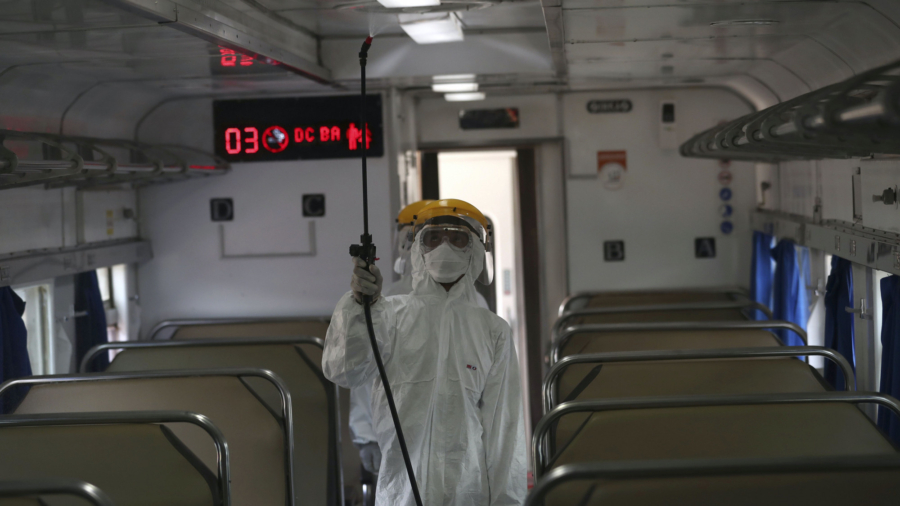ROME—Meeting with friends, dining out, worshiping and other daily routines have nearly halted as nations take drastic steps to try to stop the coronavirus pandemic.
Religious leaders gave sermons to empty pews or to the faithful watching online Sunday after public worship was curtailed in many places. The Al-Aqsa Mosque in Jerusalem’s Old City was being closed indefinitely, and the Vatican closed off next month’s Holy Week services to the public.
In the United States, health officials recommended a limit to groups of 50 or more people and a government expert said a 14-day national shutdown may be needed. Americans returning from abroad encountered chaotic airport health screenings and closed-down communities.
On the first day of Spain’s quarantine, long lines formed for food as police patrolled. Soldiers and police sealed off the Philippines’ densely populated capital, Manila, from most domestic travelers. Austria planned to limit movement, and Lebanon was put on lockdown, closing down Beirut’s famed seaside corniche.

Ireland ordered all pubs and bars to close for two weeks—including on Tuesday, St. Patrick’s Day—and urged people not even to hold house parties. Two pub industry groups had warned of the “real difficulty” in keeping people apart in the country’s famous watering holes.
Italy on Sunday reported its biggest day-to-day increase in infections—3,590 more cases in a 24-hour period—for a total of almost 24,747. And 368 more deaths brought its toll to 1,809, more than a quarter of the global death toll.
For most people, the coronavirus causes only mild or moderate symptoms, such as fever and cough, and those with mild illness recover in about two weeks. But severe illness including pneumonia can occur, especially in the elderly and people with existing health problems, and recovery could take six weeks in such cases.
The needs to stop the virus from spreading to the most vulnerable people and to not overwhelm health care systems with sick patients are pushing the urgent calls for people to avoid public crowds or just stay home.
People should go out “only alone or with the people who live in their apartment,” said Austrian Chancellor Sebastian Kurz, whose country has 800 infections.
That was echoed by one of America’s top infectious disease experts.
“I think Americans should be prepared that they are going to have to hunker down significantly more than we as a country are doing,’’ Dr. Anthony Fauci of the National Institutes of Health told NBC’s ”Meet the Press.’’

Governors in California, Illinois and Ohio told all bars and restaurants to close or reduce their number of customers. New York City will shutter the nation’s largest public school system as early as Tuesday, sending over 1.1 million children home.
With fears increasing that the pandemic will depress U.S. economic growth, the Federal Reserve took emergency action by slashing its benchmark interest rate to near zero and deciding to buy $700 billion in Treasury and mortgage bonds.
Travelers returning to the United States after the Trump administration imposed a wide-ranging ban on people entering from Europe faced hours-long waits for medical screenings.
Italy banned passengers from taking ferries to Sardinia and halted overnight train trips, which many in the north had used to reach homes and families in the south.
Spain was under lockdown amid a two-week state of emergency.
“From now, we enter into a new phase,” said Prime Minister Pedro Sánchez, whose wife tested positive. “We won’t hesitate in doing what we need must to beat the virus. We are putting health first.”

In Barcelona, there were long lines to buy bread. Police patrolled parks and told people who were not walking their dogs to go home. The Las Ramblas promenade was eerily empty.
Spain’s Health Ministry said the country has recorded 288 deaths, up from 136 on Saturday. The number of infections rose to 7,753 from 5,700.
The Czech Republic will start a lockdown Monday, and Netherlands ordered all schools, day-care centers, restaurants and bars to close until April 6.
Elsewhere, Morocco suspended all international flights, and Turkey set aside quarantine beds for more than 10,000 people returning from Islam’s religious sites in Saudi Arabia.
Even as social life largely halted, some attempts at keeping up public life persisted.
France went ahead Sunday with nationwide elections to choose mayors and other local leaders. A 1-meter (yard) gap between people was mandated, as well as soap or sanitizing gel and disinfectant wipes for voting machines.

The German state of Bavaria also held municipal elections, with poll workers wearing gloves. Germany will partially close its borders with France, Switzerland, Austria, Luxembourg and Denmark on Monday, and Interior Minister Horst Seehofer said people will no longer be allowed to cross those borders without a valid reason, such as for work.
Britain, which has not yet restricted everyday activities, said it plans to set out emergency powers this week, including potentially requiring people over 70 to self-isolate for up to four months and banning mass gatherings.
“We will do the right thing at the right time,” Health Secretary Matt Hancock told the BBC.
Puerto Rico ordered nearly all businesses to close for next two weeks and set a nighttime curfew following confirmation of a fifth case.
With the virus having reached 25 of Africa’s 54 countries, sweeping restrictions were announced. Kenya is banning travelers from countries with infections and closing all schools for three weeks.
Senegal and Mauritania also are closing schools. Senegal also banned all public gatherings for a month, stopping cruise ships from docking and suspending Muslim and Christian pilgrimages.
Dalia Samhouri, a regional official with the World Health Organization, said both Iran and Egypt, two of the most populous countries in the Mideast, were likely underreporting cases because infected people can still show no visible symptoms. Iran says it has nearly 14,000 virus cases and 724 deaths, while Egypt has reported 110 cases, including two fatalities.
By Frances D’Emilio and Joseph Wilson


